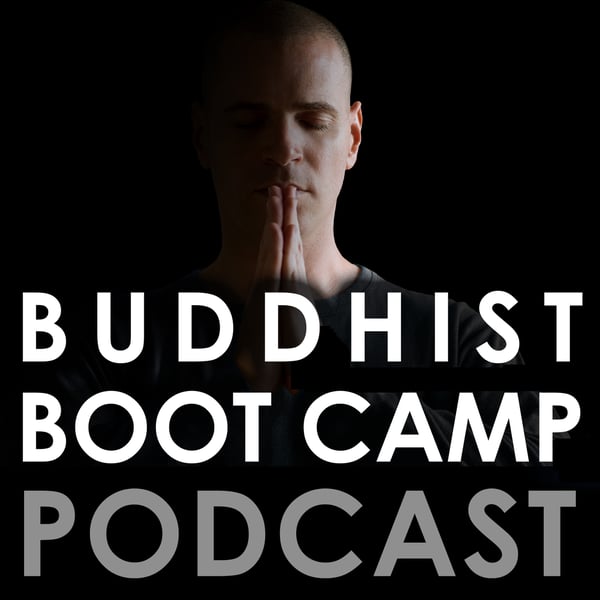Guiding Principles
Buddhist Boot Camp Podcast
Timber Hawkeye
4.8 • 907 Ratings
🗓️ 8 August 2021
⏱️ 7 minutes
🧾️ Download transcript
Summary
These principles are helpful guides to ensure our actions are aligned with our beliefs. You can either accept these guidelines or reject them, amend or append, uphold or release; there is no wrong answer. The Buddha never told us WHAT to think, he told us to think! His intention was for us to contemplate WHY we do what we do. This is so we aren't even tempted to do certain things in the first place, not because we are told not to, but because doing them would be incongruent with mindful living. I hope these principles enrich your life as much as they have mine. If you find value in these videos, please show your support at https://www.buddhistbootcamp.com/support
Transcript
Click on a timestamp to play from that location
| 0:17.0 | Welcome to the Buddhist Boot Camp Podcast. Our intention is to awaken, enlighten, enrich, and inspire a simple and uncomplicated life. Discover the benefits of mindful living with your host, Timber Hawkeye. |
| 0:33.4 | The grocery store by my house has a list of ingredients you will never find in any of the products on their shelves. It includes hydrogenated oils, MSG, food coloring, |
| 0:37.7 | high fructose corn syrup, and so on. |
| 0:40.0 | That list serves as a set of guiding principles for the owners of the store who are also transparent about making their business decisions to simultaneously best serve their community, their shareholders' interests, and of course their own bottom line, |
| 0:54.4 | bottom line, so long as no decision contradicts their core values. |
| 0:58.0 | This means that even if a profitable business opportunity presents itself, |
| 1:02.4 | they would turn it down and refuse to carry a product if it contains any of the ingredients on that list. |
| 1:08.4 | It's not about St. Hood or being perfect. It's about integrity and being in alignment, congruent and ethical. |
| 1:16.0 | Buddhism doesn't give us a specific list of ingredients to avoid, |
| 1:20.0 | nor does it have 10 commandments for us to follow with the threat of eternal |
| 1:24.1 | damnation if we don't. Buddhism invites us to consider five guiding principles |
| 1:29.5 | that are called precepts or instructions designed to help us regulate behavior and thought. |
| 1:35.6 | They are intentionally open for interpretation by each individual according to their own time, |
| 1:40.8 | place, and circumstance. |
| 1:42.8 | Following is Ticnot-Hans modern translation of the Five Buddhist precepts. |
| 1:47.9 | I will read them and you can replay this episode to listen to them again as an invitation for contemplation, not as a set of rules. |
| 1:56.0 | Pretend you are the owner of that grocery store and consider these principles a business proposition that you can either accept or reject, amend or |
| 2:05.0 | append, uphold or release. There's no wrong answer. |
| 2:09.2 | Aware of the suffering caused by the destruction of life. |
| 2:13.7 | I vow to cultivate compassion and learn ways to protect the lives of people, animals, and plants. |
| 2:20.0 | I am determined not to kill, not to let others kill, and not to condone any act of killing in my way of life. |
| 2:27.0 | Aware of the suffering caused by exploitation, social injustice, stealing, and oppression, I vow to learn how to work for the well-being of people, |
... |
Transcript will be available on the free plan in -1330 days. Upgrade to see the full transcript now.
Disclaimer: The podcast and artwork embedded on this page are from Timber Hawkeye, and are the property of its owner and not affiliated with or endorsed by Tapesearch.
Generated transcripts are the property of Timber Hawkeye and are distributed freely under the Fair Use doctrine. Transcripts generated by Tapesearch are not guaranteed to be accurate.
Copyright © Tapesearch 2025.

